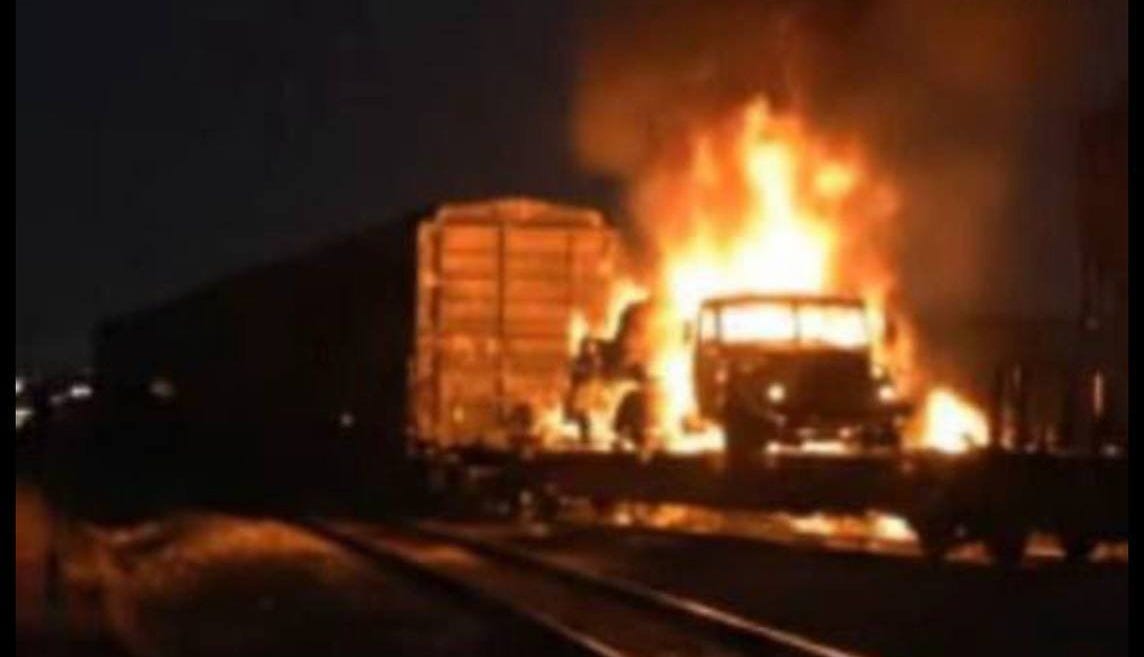Ukraine Is Systematically Shutting Down Russia's Transportation Network
An update on the war of logistics
Long-range strike drones reportedly hit a fuel and lubricants depot, an equipment train, and the Dvoynaya traction substation at the station in Orlovsky village on the Salsk railway, last night. “Tankers, tracks, and buildings are burning,” according to NOEL Reports. “The target was a key logistics hub supplying fuel and weapons to the front and Crimea. At least 9 trains have been delayed.”
Another traction substation, a facility which converts transmitted electrical power to run trains, was struck on Saturday in in the Oktyabrsky district of Volgograd Oblast. Train traffic at the Zhutovo station was delayed. “Due to the incident at Kamenolomny station in Rostov region, more than 50 trains of FPC and Grand Service Express are running with delays,” reads a 20 July statement from the state railway service.
Video of a military fuel train on fire at the Salsk rail hub. Source
If the trains are not running on time, that is very bad for Russia. If they stop running at all, it is the end of Russia, for rail carries the vast majority of passengers and cargo. There is no highway system in Russia. Instead, trucks distribute goods from railheads to the rest of Russia. And ever since Operation Spiderweb, the trucks now spend hours in inspection lines just to cross a bridge.
Airlines also carry a tiny, but critical, proportion of cargo in Russia. They are much faster than trains, able to cross all eleven time zones of the country in hours rather than the weeks required to travel the same distance on the Trans-Siberian Railway. Thus, critical parts, perishables, and passengers tend to fly, in Russia. The Aeroflot hack, which has reportedly wiped out 7,000 servers, canceled scores of flights, and stranded thousands of passengers, will take months to fix. This is a calamity for Russians, who are right in the middle of their vacation season.
Ukraine has begun shutting down major airports in Russia on a regular basis simply by flying drones in the airspace. These events create economic ripples. As one might expect, Aeroflot stock has plummeted. A two-day shutdown earlier this month cost ₽20 billion in canceled tickets and comped hotels and meals. Aeroflot employees are forced to do everything manually, inefficiently, dangerously. Shortages of spare parts and skilled labor probably already make Russian airlines the riskiest in the world.
In a post claiming responsibility for the cyberattack, the Belarussian Cyberpartisans say that the operation, which they conducted with pro-Ukrainian hacktivist group Silent Crow, wiped out the Aeroflot databases after copying them. “We have uploaded an array of flight history databases, which can now be used on request for independent investigations,” they point out. Oligarch comings and goings, the patterns of life of key Russian officials: this intelligence is now available to Ukraine, and to prosecutors worldwide.
The hacker collaboration “spent many months in Aeroflot's corporate network, developing access,” the press release says. They took over the company one employee computer at a time.
Successful penetration was largely possible due to the fact that some company employees neglect basic password security. For example, Aeroflot CEO Sergei Aleksandrovsky has not changed his password since 2022 😉
The network uses Windows XP and 2003, which resulted in the compromise of their entire infrastructure.
Rather than ask whether Putin’s Russia is ready for war with NATO, we should ask whether Putin’s Russia is even ready for cyberwar with pro-Ukraine hackers. State-owned enterprises are evidently still not ready in Year Four of the Special Military Operation, not even critical ones. I am not a financial adviser, but if Russia itself was a stock, I would still advise the reader to short-sell it.
Russia’s perennial military weakness is logistics. Everything used to fight in Ukraine must first travel hundreds or thousands of miles. Ammunition is still transported in crates rather than on pallets. Crimea is particularly rail-dependent. Atesh partisans in the peninsula have conducted a series of attacks on railroad relay cabinets and other infrastructure, causing lines to go out of service and subsequent train delays. Meanwhile, the ‘land bridge’ railway is turning out to be a liability, since it passes close enough to Ukrainian lines that trains on it are regularly subject to attacks.
Rather than ask whether Ukraine has the forces to retake Crimea, we should ask whether Russia has the logistical capacity to keep Crimea. Ukraine is ratcheting up costs and risks all the time, while the critical Russian enterprises — railways and airlines — are increasingly dysfunctional, feebly muddling along in the carnage. Vladimir Putin’s big summer offensive is failing and stalling out because the war machinery is sputtering.
How Ukraine Attacks Russian Logistics
It was almost lost in the news about Operation Spiderweb this Sunday, then forgotten in the strike on the Kerch Strait Bridge on Monday, that two Russian train bridges also collapsed, derailing a freight train and a passenger train. Altogether, seven riders were killed and at least 79 more civilians were injured. Russian officials blamed both collapses, which took place a few hours apart, on explosions. Both rail lines were put out of service.




